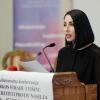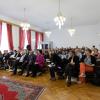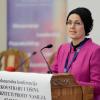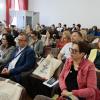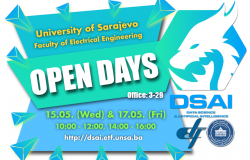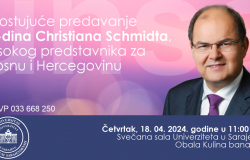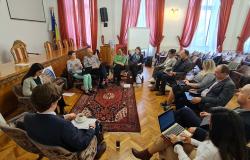Universities against violence - both in practice and feminist epistemology
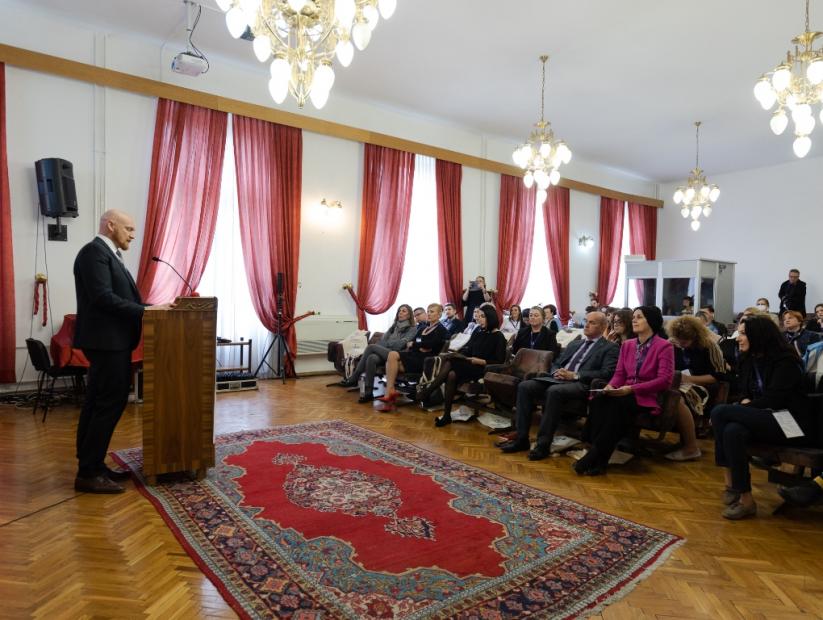
“Despite Fear and Silence: Universities Against Violence” is the name of the international conference that was organized on 6 and 7 May 2022 at the University of Sarajevo Rectorate. During the two conference days, more than 70 BiH, regional and international scientists discussed a number of topics related to gender issues in the broad field of higher education. Over two days, and through 8 parallel panels, over 30 works by authors from Bosnia and Herzegovina, Montenegro, Croatia, Slovenia, Serbia and Austria and the United Kingdom were presented.
The conference was opened by a lecture by Prof. Dr. Kirsten Campbell (Goldsmiths, University of London, UK) on the topic of violence as a feminist problem - the production of knowledge about sexual and gender-based violence.
Language and gender was the topic of the first panel, moderated by Prof. Dr. Ajla Demiragić. The panel discussed the possibilities, perspectives and possible limitations of the introduction of gender-sensitive language at the university level. It was emphasized that leaving the space of patriarchy produces a feeling of inadequacy and that it is important to produce a sense of security and adequacy in spaces outside the patriarchate. The importance of research on this topic was emphasized within the panel. The importance of developing public policies that would include the use of gender-sensitive language and in which, in addition to linguists, public policy experts and all those interested in this issue would participate, was also emphasized.
Panel 2 (Gender, Body and Violence) was moderated by Prof. Dr. Jasmina Husanović, and the presentations touched on the following topics: instrumentalization and commercialization of the female body through the culture of beauty and beauty, the consequences of imposing the ideals of femininity, as well as the policy of (dis) satisfaction with the body and active transformation, motivation and rationalization of beauty and beauty ”And“ self-confidence ”, but essentially mostly through“ attractiveness ”as a goal, internalization of these regulatory and disciplinary norms under the pressure of media culture, linking liberal political beliefs with greater awareness of gender-based violence and recognition skills on violent patterns of behavior within gender relations in BiH, the importance of collective action in the direction of social security for women, and the issue of solidarity versus the issue of competition between women.
Panel 3 (Gender stereotypes: in culture and education) was moderated by Prof. Dr. Nerzuk Ćurak. The panel examined broader contexts that create barriers to combating gender-based violence, with a focus on domestic violence. In the curricula, we are witnessing a lower representation of teaching content on gender-based violence and domestic violence. On the other hand, students, future professionals who will work on the prevention of violence and providing support to victims, advocate attitudes that indicate a conservative attitude towards equality and the heritage of gender stereotypes. What is the role of religion in the fight against the stereotypical understanding of gender roles, and what is its power to influence positive changes.
Panel 4 was moderated by Prof. Dr. Amila Ždralović, and various methodological and theoretical challenges to feminist research were mapped through the panel. The starting point of the panel was the methodological approaches and challenges in the design and implementation of feminist research itself, especially when it comes to qualitative methodology. The question of research ethics is also open, but also the question of how much (and improved) research procedures have changed (and improved) through feminist research, ie research that takes gender and specific women's experiences as the central category of analysis. The discussion focused on the conceptual issues of interpretation of the obtained data, through the prism of intersectionality and critical realism. The presentations also address specific experiences, primarily the experiences of UNIGEM quantitative and qualitative research. These specific feminist experiences are significant in a broader context (primarily in the social sciences and humanities) because they significantly deconstruct traditional paths of analysis that tend to ‘capture’ what is common and continuously invisible in research. The issue of the degeneration of higher education is also open.
The first working day was closed by a lecture given by Prof. Dr. Anna Bull (Department of Education, University of York, UK), on the topic - Combating sexually inappropriate behavior of teachers/staff in higher education in the UK.
The second day began with parallel panels 5 and 6. Panel 5 (Media, Education and Gender-Based Violence) moderated by Prof. Dr. Valida Repovac Nikšić, and the panel was a kind of continuation of the panel Gender and Language, according to the choice of topics and issues for discussion. The presentations of the panelists were focused on presenting the results of empirical research. The case study of the University of Belgrade also presents an analysis of regulations at certain faculties that regulate, among other things, gender-based violence and sexual violence in the digital space. Panel 6 opened the topic of sexual harassment in the academic environment, moderated by Prof. Dr. Jasna Kovačević, and which presented concrete data and facts about the fact that academic institutions are often a place of misogyny, visible and invisible gender-based harassment and violence. Dr. sc. Ana Belem Amil (Gender Equality Officer, CEU, Wien, Austria) gave a lecture on the fight against sexual harassment in higher education and innovation in the politics of this fight.
Panel 7 opened the issues of gender discrimination and institutional policies, moderated by Mr. Sc. Miroslav Živanović. The level of defining concepts shows how complex sexual harassment is. Laws define and regulate sexual harassment, but even in the definitions themselves there are inaccuracies and inadequate explanations. Terminological dilemmas and dilemmas in defining concepts must be resolved, because this is not only a formal issue but also essential because it expands the circle of people who are protected by these laws from sexual violence. The application of affirmative action in favor of the underrepresented sex in the field of higher education was also discussed. Two problems arise when it comes to these affirmative measures - it is not known whether these measures are successful, which raises the question of whether affirmative measures are really an adequate response to gender inequality in higher education. However, the practice of other countries shows that the introduction of affirmative action measures, in the field of labor and other areas, is the way to achieve gender equality.
The final panel was 8th (Gender inequality in professional life) and was moderated by Prof. Dr. Duško Trninić, and the panel presented papers that problematized women's inequality in employment and career development from different angles. Among other things, it was emphasized that it is important that gender action plans are plans based on data based on universities.
The conference was closed by a speech by Prof. Dr. Biljana Kašić, feminist and postcolonial theorist from Zagreb on the relationship between epistemic and gender-based violence at the university, their intersections and contradictions.
The conference was organized by the TPO Foundation and the University of Sarajevo (UNSA), in cooperation with the co-organizers: International University of Travnik (IUT), University of Herzegovina (SVEHER), University of Mostar (SVEMO), University of Zagreb (UNIZG), University of Banja Ports (UNBL), University of Bihać (UNBI), University of Montenegro (UCG), University of Donja Gorica (UDG), Džemal Bijedić University of Mostar (UNMO), University of East Sarajevo (UES), University of Novi Sad (UNS) and the University of Zenica (UNZE).
The University and Gender Mainstreaming (UNIGEM) Project is supported by the UK Government.




